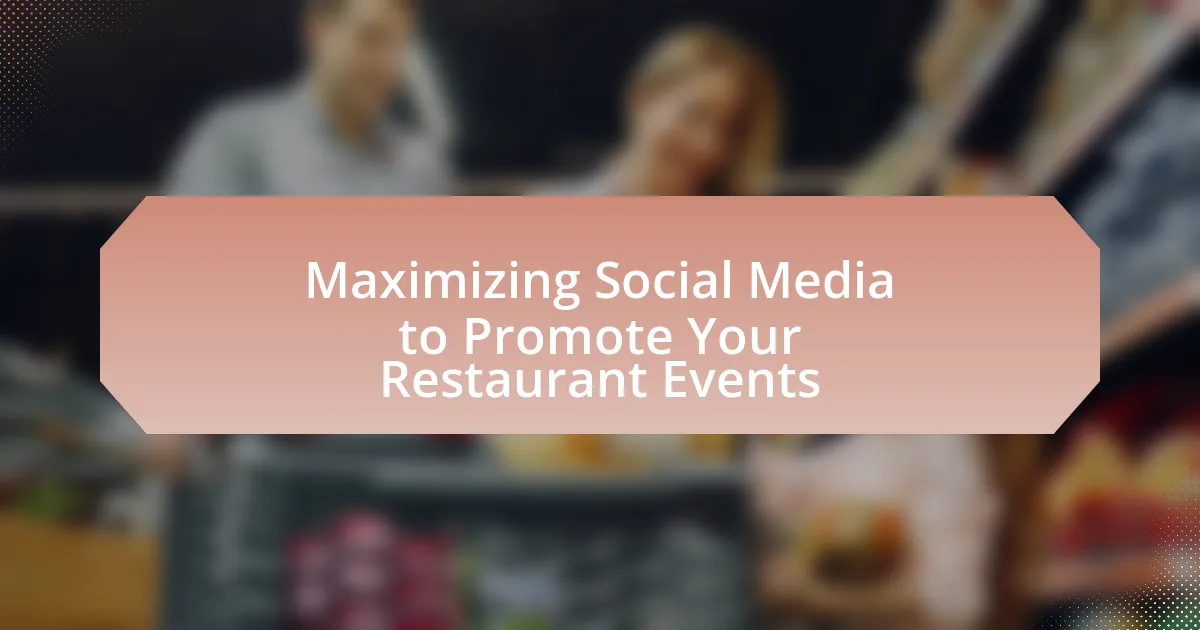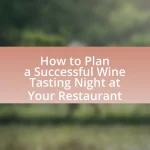The article focuses on maximizing social media to promote restaurant events, emphasizing its critical role in engaging potential customers and enhancing visibility. It outlines effective strategies for utilizing platforms like Facebook, Instagram, and Twitter, highlighting the importance of targeted advertising, engaging content, and audience interaction. Key elements of a successful social media strategy are discussed, including content types, the impact of user-generated content, and the significance of hashtags. Additionally, the article addresses how to measure the success of social media promotions through engagement metrics and audience feedback, providing best practices for restaurants to optimize their event marketing efforts.
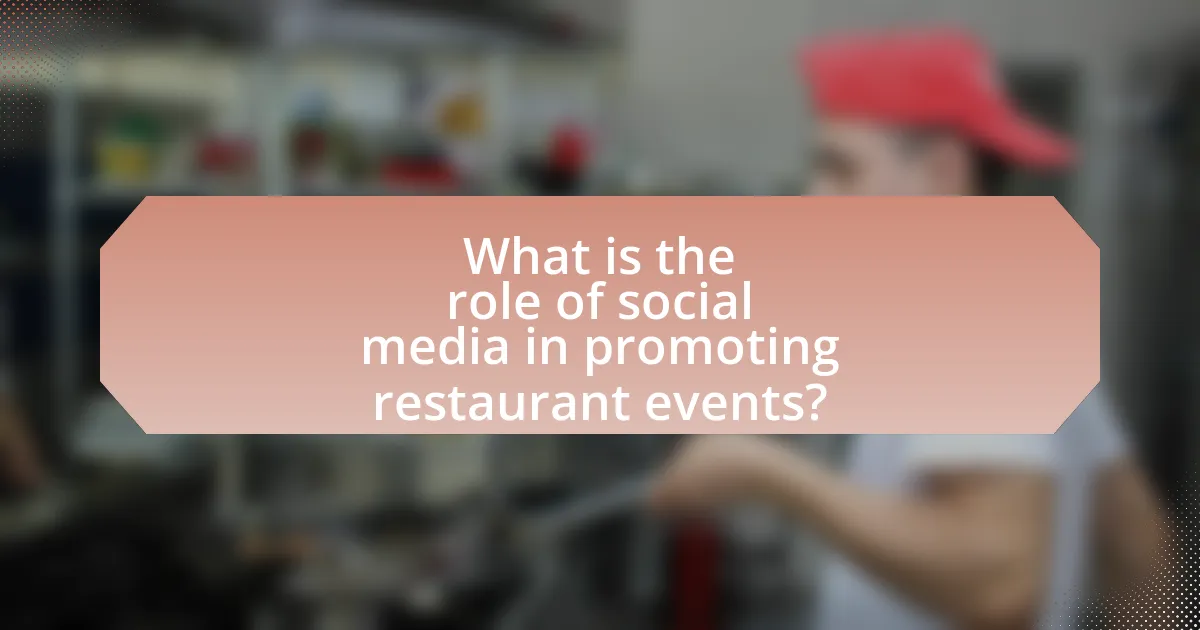
What is the role of social media in promoting restaurant events?
Social media plays a crucial role in promoting restaurant events by providing a platform for direct engagement with potential customers. It allows restaurants to share event details, create buzz, and reach a wider audience through targeted advertising and organic reach. For instance, a study by the National Restaurant Association found that 70% of consumers are influenced by social media when deciding where to eat, highlighting its effectiveness in driving attendance to events. Additionally, social media enables real-time interaction, allowing restaurants to respond to inquiries and share user-generated content, which further enhances visibility and credibility.
How can social media enhance visibility for restaurant events?
Social media enhances visibility for restaurant events by allowing restaurants to reach a broader audience through targeted advertising and organic engagement. Platforms like Facebook and Instagram enable restaurants to create event pages, share engaging content, and utilize features such as stories and live videos to showcase events in real-time. According to a study by the National Restaurant Association, 70% of consumers are influenced by social media when deciding where to dine, highlighting the effectiveness of these platforms in attracting attendees. Additionally, user-generated content, such as customer posts and reviews, can further amplify visibility and credibility, driving more interest and participation in restaurant events.
What platforms are most effective for restaurant event promotion?
Social media platforms such as Facebook, Instagram, and Twitter are most effective for restaurant event promotion. Facebook allows for targeted advertising and event creation, reaching a broad audience with specific interests. Instagram’s visual nature engages users through appealing images and stories, making it ideal for showcasing food and ambiance. Twitter facilitates real-time updates and interactions, helping to create buzz around events. According to a study by the National Restaurant Association, 70% of consumers use social media to discover new dining experiences, highlighting the importance of these platforms in reaching potential customers effectively.
How does audience engagement on social media impact event attendance?
Audience engagement on social media significantly enhances event attendance by creating awareness and fostering a sense of community among potential attendees. Engaged audiences are more likely to share event details, leading to increased visibility; for instance, a study by Eventbrite found that events promoted through social media see a 20% higher attendance rate compared to those that are not. Additionally, interactive content such as polls, contests, and live updates can generate excitement and anticipation, further motivating individuals to attend. This correlation between engagement and attendance is supported by data indicating that 78% of event attendees are influenced by social media interactions when deciding to participate in an event.
Why is it important to have a social media strategy for restaurant events?
A social media strategy for restaurant events is crucial because it enhances visibility and engagement, driving attendance and increasing revenue. Effective social media strategies allow restaurants to target specific demographics, share event details, and create buzz through engaging content. For instance, according to a study by the National Restaurant Association, 70% of consumers are influenced by social media when deciding where to dine, highlighting the importance of a strategic approach to reach potential customers. Additionally, a well-executed strategy can lead to increased brand loyalty, as consistent engagement fosters a community around the restaurant, encouraging repeat visits and word-of-mouth referrals.
What elements should be included in a social media strategy?
A social media strategy should include clear objectives, target audience identification, content planning, platform selection, engagement tactics, and performance metrics. Clear objectives define what the restaurant aims to achieve, such as increasing event attendance or brand awareness. Identifying the target audience helps tailor content to their preferences, ensuring relevance and engagement. Content planning involves creating a calendar that outlines what to post and when, focusing on promotional materials for events. Selecting the right platforms, such as Instagram or Facebook, is crucial for reaching the intended audience effectively. Engagement tactics, including responding to comments and hosting giveaways, foster community interaction. Finally, performance metrics, such as engagement rates and conversion tracking, allow for assessing the strategy’s effectiveness and making necessary adjustments.
How can a well-defined strategy improve event outcomes?
A well-defined strategy can significantly improve event outcomes by ensuring targeted messaging and effective resource allocation. When a restaurant implements a clear strategy for promoting events on social media, it can identify the right audience, tailor content to their preferences, and choose optimal platforms for engagement. For instance, research from the Social Media Examiner indicates that businesses with a documented social media strategy are 313% more likely to report success in their marketing efforts. This statistic underscores the importance of strategic planning in achieving measurable results, such as increased attendance and enhanced customer engagement during events.
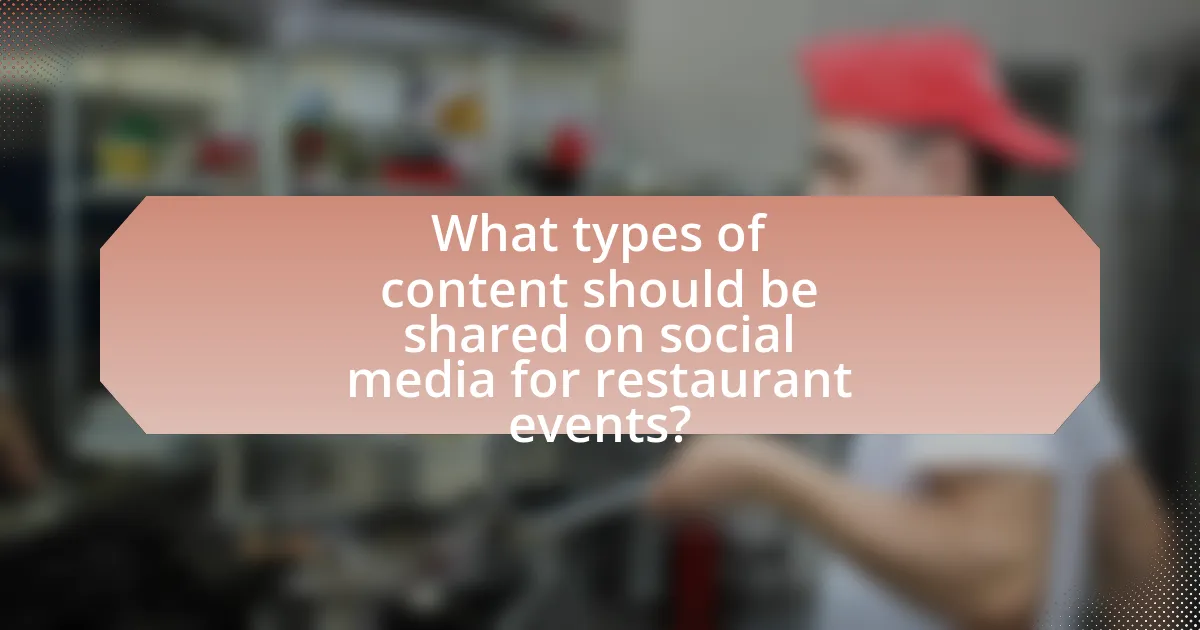
What types of content should be shared on social media for restaurant events?
To effectively promote restaurant events on social media, share content types such as event announcements, behind-the-scenes footage, customer testimonials, and engaging visuals of food and drinks. Event announcements inform followers about upcoming happenings, while behind-the-scenes content provides a personal touch that can enhance customer connection. Customer testimonials serve as social proof, showcasing positive experiences, and engaging visuals attract attention and stimulate interest. According to a study by Sprout Social, posts with images receive 650% higher engagement than text-only posts, reinforcing the importance of visual content in social media marketing for restaurants.
How can visual content attract more attendees to restaurant events?
Visual content can attract more attendees to restaurant events by showcasing the ambiance, food, and experiences through high-quality images and videos. Engaging visuals create a strong emotional connection, making potential attendees more likely to envision themselves at the event. Research indicates that posts with images receive 94% more views than those without, highlighting the effectiveness of visual content in capturing attention. Additionally, platforms like Instagram report that 80% of users follow at least one business, emphasizing the importance of visually appealing content in driving engagement and attendance.
What types of images or videos are most effective for promotion?
High-quality images and engaging videos showcasing food, ambiance, and customer experiences are most effective for promotion. These visuals attract attention and evoke emotions, leading to higher engagement rates. Research indicates that posts with images receive 94% more views than those without, while videos can increase engagement by up to 1200% on social media platforms. Specifically, images of beautifully plated dishes and videos of lively restaurant events resonate well with potential customers, driving interest and foot traffic.
How can user-generated content enhance event marketing?
User-generated content enhances event marketing by increasing engagement and authenticity. When attendees share their experiences through photos, videos, and testimonials, it creates a sense of community and trust around the event. According to a study by Nielsen, 92% of consumers trust organic, user-generated content more than traditional advertising, which can lead to higher attendance and participation rates. Additionally, user-generated content can be leveraged across social media platforms to reach a broader audience, as posts featuring real experiences often generate more shares and interactions than branded content. This organic promotion not only boosts visibility but also fosters a deeper connection with potential attendees, ultimately driving event success.
What role do hashtags play in promoting restaurant events on social media?
Hashtags play a crucial role in promoting restaurant events on social media by increasing visibility and engagement. When restaurants use relevant hashtags, they categorize their content, making it easier for potential customers to discover events through search functions. For instance, a study by Sprout Social found that posts with at least one hashtag receive 12.6% more engagement than those without. This demonstrates that effective hashtag usage can significantly enhance the reach of promotional content, attracting a larger audience to restaurant events.
How can the right hashtags increase event reach?
The right hashtags can significantly increase event reach by enhancing discoverability on social media platforms. When users search for or click on specific hashtags, they can find content related to their interests, leading to greater visibility for the event. For instance, a study by TrackMaven found that posts with at least one hashtag receive 12.6% more engagement than those without. This increased engagement can translate into higher attendance and awareness of the event, as more users interact with the content and share it within their networks.
What are some examples of effective hashtags for restaurant events?
Effective hashtags for restaurant events include #FoodieFest, #DineAndWine, #TastyTuesday, #BrunchBash, #HappyHour, and #CulinaryExperience. These hashtags are popular among users seeking dining experiences and help increase visibility on social media platforms. For instance, #FoodieFest is often used to attract food enthusiasts to special events, while #HappyHour targets patrons looking for drink specials. Utilizing these specific hashtags can enhance engagement and reach within the restaurant community.
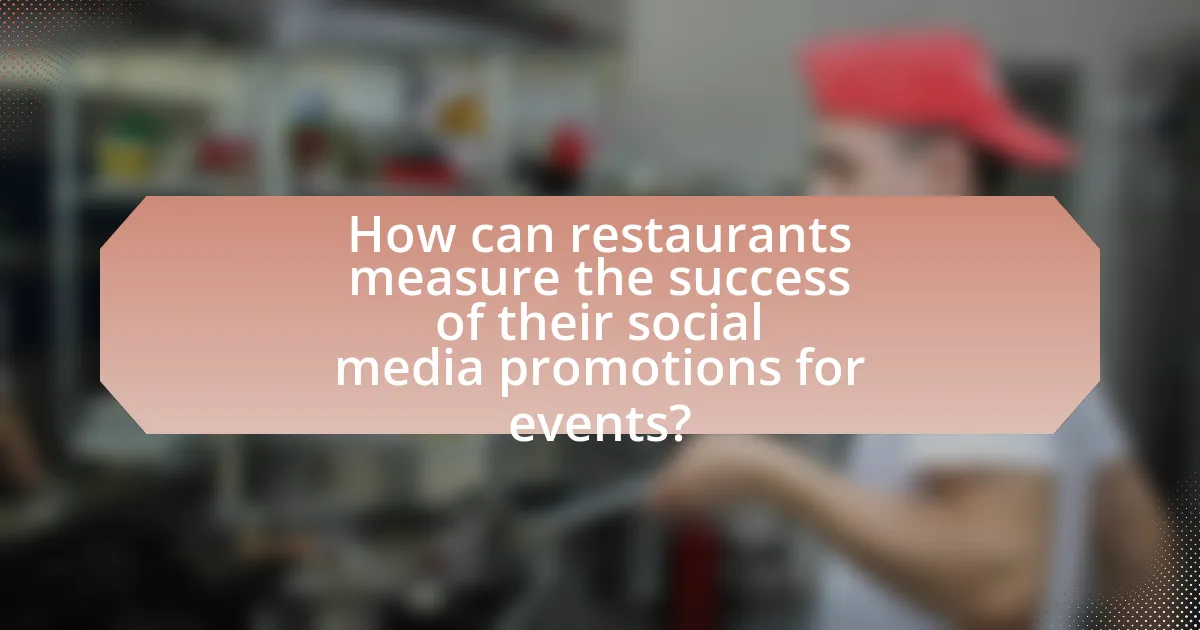
How can restaurants measure the success of their social media promotions for events?
Restaurants can measure the success of their social media promotions for events by analyzing engagement metrics, attendance rates, and sales data. Engagement metrics include likes, shares, comments, and reach on social media platforms, which indicate how well the promotional content resonated with the audience. Attendance rates can be tracked through reservations or ticket sales linked to the promotion, providing direct insight into the effectiveness of the campaign. Additionally, comparing sales data before, during, and after the event can reveal the financial impact of the promotion, allowing restaurants to assess return on investment. For example, a study by Sprout Social found that 70% of consumers are more likely to attend an event if they see it promoted on social media, highlighting the importance of these metrics in evaluating success.
What metrics should be tracked to evaluate social media effectiveness?
To evaluate social media effectiveness, key metrics include engagement rate, reach, impressions, follower growth, and conversion rate. Engagement rate measures the level of interaction (likes, comments, shares) relative to total followers, indicating how well content resonates with the audience. Reach quantifies the number of unique users who see posts, while impressions count total views, helping assess visibility. Follower growth tracks the increase in audience size over time, reflecting brand interest. Conversion rate measures the percentage of users taking desired actions, such as reservations or event sign-ups, directly linking social media efforts to business outcomes. These metrics provide a comprehensive view of social media performance, enabling data-driven adjustments to strategies.
How can engagement rates inform future event strategies?
Engagement rates can inform future event strategies by providing insights into audience preferences and behaviors. Analyzing metrics such as likes, shares, comments, and attendance can reveal which types of content resonate most with the audience, allowing event planners to tailor future events to align with these interests. For instance, if a particular event garners high engagement on social media, it indicates strong audience interest, suggesting that similar themes or formats could be successful in future events. Additionally, tracking engagement trends over time can help identify peak times for promotions and optimal content types, enhancing overall event effectiveness.
What tools can assist in measuring social media performance?
Tools that can assist in measuring social media performance include Hootsuite, Sprout Social, and Google Analytics. Hootsuite provides comprehensive analytics on engagement, reach, and audience demographics, allowing users to track performance across multiple platforms. Sprout Social offers in-depth reporting features that analyze social media interactions and trends, helping businesses understand their audience better. Google Analytics can track referral traffic from social media to a website, providing insights into user behavior and conversion rates. These tools are widely recognized for their effectiveness in delivering actionable insights into social media strategies.
How can feedback from social media influence future restaurant events?
Feedback from social media can significantly influence future restaurant events by providing insights into customer preferences and experiences. Restaurants can analyze comments, reviews, and engagement metrics to identify popular themes, menu items, or event formats that resonate with their audience. For instance, a study by Sprout Social found that 79% of consumers are influenced by social media posts when making dining decisions, indicating that positive feedback can lead to increased attendance at similar future events. Additionally, negative feedback can highlight areas for improvement, allowing restaurants to adjust their offerings and enhance customer satisfaction in subsequent events.
What methods can be used to gather audience feedback online?
Surveys and polls are effective methods to gather audience feedback online. These tools allow restaurants to directly ask customers about their experiences, preferences, and suggestions, facilitating data collection that can inform marketing strategies. For instance, platforms like SurveyMonkey and Google Forms enable easy creation and distribution of surveys, while social media platforms like Instagram and Twitter offer built-in polling features that engage users in real-time. Research indicates that 70% of consumers prefer to provide feedback through online surveys, highlighting their effectiveness in capturing audience insights.
How can feedback be integrated into planning future events?
Feedback can be integrated into planning future events by systematically collecting and analyzing responses from attendees after each event. This process allows event planners to identify strengths and weaknesses, enabling them to make informed adjustments for future events. For instance, surveys can be distributed via email or social media platforms immediately following an event, asking specific questions about attendees’ experiences, preferences, and suggestions for improvement. Research shows that 70% of consumers are more likely to return to an event if their feedback is acknowledged and acted upon. By utilizing this data, planners can enhance aspects such as marketing strategies, menu offerings, and overall event logistics, ultimately leading to increased attendee satisfaction and engagement in future events.
What are some best practices for maximizing social media to promote restaurant events?
To maximize social media for promoting restaurant events, utilize targeted advertising, engaging content, and strategic partnerships. Targeted advertising allows restaurants to reach specific demographics, increasing event visibility; for instance, Facebook Ads can be tailored to local audiences based on interests and behaviors. Engaging content, such as high-quality images, videos, and interactive posts, captures attention and encourages shares, enhancing organic reach. Additionally, collaborating with local influencers or businesses can amplify promotion efforts, as their established audiences can drive traffic to the event. According to a study by Sprout Social, posts with images receive 650% more engagement than text-only posts, underscoring the importance of visual content in social media marketing.
How can restaurants create a consistent posting schedule for events?
Restaurants can create a consistent posting schedule for events by utilizing a content calendar that outlines specific dates and times for posts across various social media platforms. This approach allows restaurants to plan ahead, ensuring that they promote events in a timely manner while maintaining a steady flow of content. Research indicates that businesses that use a content calendar experience a 30% increase in engagement, as it helps streamline the posting process and ensures that no important events are overlooked. By scheduling posts in advance, restaurants can also align their promotions with relevant holidays or local events, further enhancing visibility and engagement.
What are effective ways to collaborate with influencers for event promotion?
Effective ways to collaborate with influencers for event promotion include establishing clear objectives, selecting the right influencers, and creating engaging content. Setting specific goals, such as increasing event attendance or enhancing brand awareness, helps guide the collaboration. Choosing influencers whose audience aligns with the event’s target demographic ensures a more impactful reach. Additionally, co-creating content, such as behind-the-scenes videos or exclusive previews, fosters authenticity and encourages audience engagement. According to a study by the Digital Marketing Institute, 49% of consumers depend on influencer recommendations, highlighting the effectiveness of this strategy in driving event participation.
